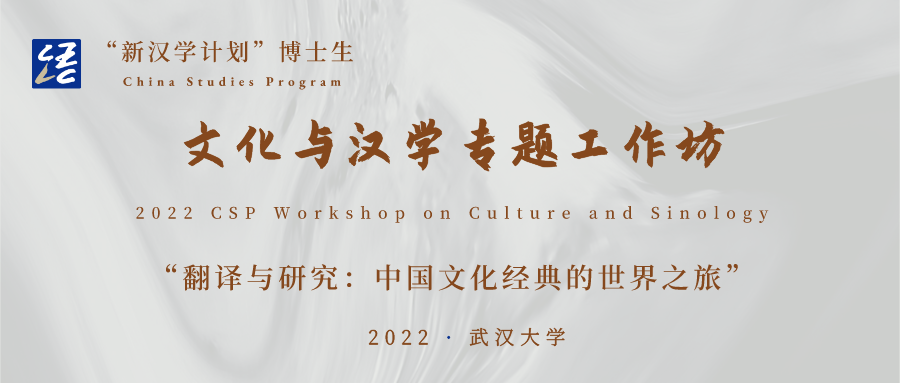2022年“新汉学计划”博士生文化与汉学专题工作坊
2022 CSP Workshop onCulture and Sinologyfor Ph.D. Students
征 稿 启 事
Call for Papers

主办方:
武汉大学中国传统文化研究中心
武汉大学国际教育学院
中外语言合作交流中心
Co-Organizers:
Center for Studies of Traditional Chinese Culture, Wuhan University
School of International Education, Wuhan University
Center for Language Education and Cooperation
01 工作坊主题
Theme of the Workshop
翻译与研究:中国文化经典的世界之旅
Translation and Study: The Global Travel of Chinese Cultural Classics
中国文化经典在域外的传播是中国文化“走出去”的重要内容之一,从历史来看大体可分为两方面:一方面是中国文化经典通过书籍之路直接向外输出,由此成为域外文化语境中的汉籍,并被作为构成该国文化展开的重要内容,前近代东亚汉文化圈的形成即为其重要体现。近代以后东亚各国关于中国传统文化的研究,则一般被作为世界汉学研究的一部分。另一方面,明末清初来华传教士在向中国输入西学的同时,也以各种不同形式将中国文化经典带到西方,通过将汉文著作译成西文,推动中国文化在欧洲的传播,并逐渐扩及到世界各地。从16世纪末西班牙传教士高母羡翻译《明心宝鉴》(明初范立本编,洪武二十六年刊本)开始,越来越多的中国文化经典被译介到西方,引起越来越多域外学者对中国文化的关注,进而形成世界学术体系中的重要一支——汉学。本工作坊以世界汉学研究视野中的中国文化经典为研讨对象,内容包括从经典翻译到研究的各个方面。
The oversea dissemination of Chinese cultural classics, is one of the important contents of the “going-out” of Chinese culture, which, historically, can be divided into two aspects: Firstly, the direct exportation of Chinese cultural classics through the Book Road (which means original Chinese books were brought abroad, directly learned and studied by foreigners), these books finally become Chinese books in the cultural context of foreign countries, and are regarded as important contents constituting the development of the target country’s culture. The formation of sinosphere in pre-modern East Asia is an important manifestation of the Book Road, while the study of traditional Chinese culture in East Asian countries after the modern period is generally regarded as part of the World Sinology Studyies. Secondly, the missionaries who came to China in the late Ming and early Qing dynasties, while importing Western knowledge into China, also brought the classics of Chinese culture to the West in various methods, by translating Chinese writings into Western languages, they promoted the spread of Chinese culture in Europe and gradually to the rest of the world. Since the Spanish missionary Fray Juan Cobo’s translation of Ming Xin Bao Jian (edited by Fan Liben in the early Ming Dynasty and published in the 26th year of the Hongwu era) at the end of 16th century, an increasing number of Chinese cultural classics were translated into Western languages, attracting more and more foreign scholars to pay attention to Chinese culture, and then formed an important branch of the world academic system - Sinology. This workshop will focus on the classics of Chinese culture from the perspective of the global sinology studies, covering everything from the translations of the classics and studies on them.
欢迎国内外对此主题感兴趣的博士生们投稿,可以聚焦但不限于以下议题:
Ph.D. students from home and abroad who are interested in this theme are welcome to submit a paper focusing on, but not limited to the following topics:
· 中国文化经典外译Translations of Chinese cultural classics
· 中国文化经典的世界传播Global Spread of Chinese cultural classics
· 中国文化经典与世界文明发展 Chinese Cultural Classics and Development of World Civilization
· 海外汉学中的中国文化经典研究The Study of Chinese Cultural Classics in Sinology Overseas
·……
02 工作坊形式与时间
Format and Time of the Workshop
工作坊形式:本次工作坊将采用线上与线下相结合的方式举办(具体安排视疫情情况而定)。本次工作坊包括但不限于以下环节:
(1)优秀学术论文分享与讨论
(2)国内外相关领域的知名专家学者及期刊编辑参与讨论、分享与点评
Format: The workshop will be held in a combination of online and offline forms(the specific arrangement depends on the epidemic situation). It includes but is not limited to the following sessions:
- Sharing and discussion of excellent academic papers.
- Well-known experts, scholars and journal editors in related fields at home and abroad participating in discussions, sharing and comments.
工作坊时间:2022年12月16-18日(暂定)
工作坊地点:武汉大学中国传统文化研究中心(线下),具体线下线上地址将在后续通知中公布。
参会费用:本次工作坊不收取任何会务费用。承办方将为现场参会者提供午餐,往返交通费、住宿费用自理。
Time: December 16th-18th,2022.
Location:(offline)- at the Center for Studies of Traditional Chinese Culture, Wuhan University, Wuhan, Hubei province, China. The specific arrangement on the venues both online and offline will be announced in a subsequent notice.
Notice on fees: No fees will be charged for the conference participants. Free lunch will be provided for the on-site participants, while the round-trip transportation and accommodation expenses should be paid by participants themselves.
03 评选说明
Information on Evaluation
本次工作坊将邀请相关领域的专家组成学术委员会,对投稿文章进行双向匿名评审,现场给予点评意见,并最后选拔 6 篇优秀论文,颁发获奖证书。此外,您可以获得
· 专业的指导
· 文章被收录论文集的机会
· 文章被推荐发表的机会
Experts and scholars in related fields will be invited to conduct a two-way anonymous review of submitted articles, give comments on the spot, and finally select 6 outstanding papers and issue award certificates. In addition, you can get
- Professional guidance on your articles.
- The opportunity for your articles to be included in Proceedings.
- The opportunity for your articles to be recommended for publication.
04 工作坊投稿要求
Requirements on the Articles
投稿文章应为未公开发表的原创文章,第一作者应为海内外院校的在读博士生,如有他人合作,投稿前需征得同意。文章应以中文写作,内容与本次工作坊的主题相关。
论文格式请参照《历史研究》的投稿要求(投稿最好不超过2.5万字)。
论文文件请以“题目+姓名+专业+联系方式”进行命名。投稿截止日期为2022年11月10日,入选名单将于11月30日公布。
投稿邮箱:ricyjs@whu.edu.cn
The workshop accepts unpublished and original articles. The first author should be a doctoral student. If the article is co-authored, approval of other authors must be obtained before submission. Articles should be written in Chinese with no more than 25,000 words (excluding footnotes), and the content should be related to the theme of this workshop.
For format requirements, please refer to the submission guidelines of “HISTORICAL RESEARCH”.
Articles are required to be submitted as an attachment in Pdf or Word document format via the email (ricyjs@ whu.edu.cn).
The file should be named as "title + name + major + contact information". The deadline for submission is 10 November, 2022. Successful submission will be announced on 30 November, 2022.
05 联系方式
Contact Information
如有如何关于投稿或参会相关的疑问,请发送邮件至ricyjs@whu.edu.cn
If there is any difficulty in submitting your article or any question related to the workshop, please contact
ricyjs@whu.edu.cn